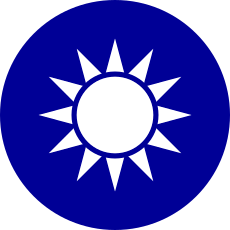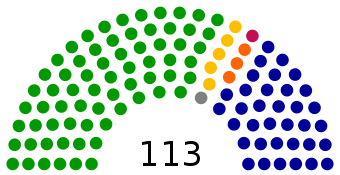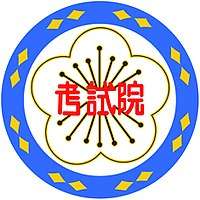Additional Articles of the Constitution of the Republic of China
|
Additional Articles of the Constitution of the Republic of China | |||||||||||||||||||||||||||
| Traditional Chinese |
中華民國憲法 增修條文 | ||||||||||||||||||||||||||
|---|---|---|---|---|---|---|---|---|---|---|---|---|---|---|---|---|---|---|---|---|---|---|---|---|---|---|---|
| Simplified Chinese |
中华民国宪法 增修条文 | ||||||||||||||||||||||||||
| |||||||||||||||||||||||||||
 |
|---|
| This article is part of a series on the politics and government of the Republic of China |
|
Leadership |

|
|
Other branches |
|
Related topics |
|
|
The Additional Articles of the Constitution of the Republic of China (Chinese: 中華民國憲法增修條文) are the revisions and constitutional amendments to the original constitution to meet the requisites of the nation and the political status of Taiwan.
The Additional Articles are the fundamental law of the present government of the Republic of China on Taiwan since 1991.
Articles
- Article 1: Referendum on amendment to the Constitution and alteration of the national territory.
- Article 2: President and the vice president.
- Article 3: Premier and the Executive Yuan.
- Article 4: Legislative Yuan.
- Article 5: Judicial Yuan.
- Article 6: Examination Yuan.
- Article 7: Control Yuan.
- Article 8: Remuneration and pay of the members of the Legislative Yuan.
- Article 9: Local governments.
- Article 10: Fundamental national policy.
- Article 11: Cross-Strait relations (rights and obligations between people of the free area and mainland China).
- Article 12: Procedure for amending the Constitution.
Comparison of the governmental structure
The present structure of government are regulated by the Additional Articles in 2005.[1]
| Governmental structure | Original Constitution (1947) | Additional Articles (2005) |
|---|---|---|
| Head of state | The president and the vice president are elected separately by the National Assembly for a duration of 6 years | The president and the vice president are elected in pair by the citizens of the Free area for a duration of 4 years, limited to 2 terms. |
| Head of government | The premier is nominated by the president, and consented by the Legislative Yuan. | The premier is appointed by the president. |
| Parliament | Tricameralism: National Assembly, Legislative Yuan and Control Yuan. The members of the National Assembly are elected for a duration of 6 years. The members of the Legislative Yuan are elected for a duration of 3 years. The members of the Control Yuan are elected by provincial legislators for a duration of 6 years. | Unicameralism: Legislative Yuan. The National Assembly is abolished, and its functions are exercised directly by the citizens of the Free area. The 113 members of the Legislative Yuan are elected for a duration of 4 years. The Control Yuan, though retained, is now a purely auditory body, and its 29 members are nominated by the president, and confirmed by the Legislative Yuan for a duration of 6 years. |
| Judiciary | The justices are nominated by the president, and consented by the Control Yuan. The justices are tenure. | The 15 justices are nominated by the president, and confirmed by the Legislative Yuan for a duration of 8 years. |
| Local government | Two level system: provincial Level, county Level | The provinces are streamlined. Counties and cities under provinces are subordinated directly to the central government. |
Constitution amendments
Before the Additional Articles in 2005, the constitution amendments need to be passed by the National Assembly. Since the Additional Articles ratified on 7 June 2005, the National Assembly is replaced by the Legislative Yuan. Constitution amendments need to be passed by three quarters of the members of Legislative Yuan, with more than half (50%) of voters hold referendums to approve the amendments.
See also
References
External links
| Wikisource has original text related to this article: |
| Wikibooks has a book on the topic of: Annotated Republic of China Laws/Additional Articles of the Constitution of the Republic of China |
- Additional Articles of the Constitution by the Office of the President, Republic of China (Taiwan)
- English translation of the Additional Articles of the Constitution (2005 reform)
- English translation of the Constitution by the Taiwan Documents Project.
- Constitution day and constitutional government


